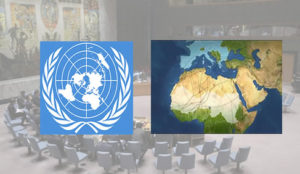 A Security Council delegation has arrived this weekend to the Sahel. It will visit Mali and Burkina Faso. In view of the long lasting Mali crisis and the worrying developments in Burkina Faso, that is the right focus. Then, what after?
A Security Council delegation has arrived this weekend to the Sahel. It will visit Mali and Burkina Faso. In view of the long lasting Mali crisis and the worrying developments in Burkina Faso, that is the right focus. Then, what after?
A deeper and expanding crisis.
Since 2013 and the establishment of the Multidimensional Integrated Stabilization Mission in Mali – MINUSMA – this is the fourth Council mission to visit the Sahel. The previous ones took place in February 2014, March 2016 and October 2017.
As they have done at each of its past visits, terrorists ‘’greeted’’ the Security Council delegation with bloody attacks. The first was on 19 March and the second, this Saturday 23, in central Mali. Mali Army has announced dozens of victims within its ranks and among civilians.
The present mission is taking place before a Council ministerial meeting on Mali scheduled for later next week. The renewal of the MINUSMA mandate is to be discussed next June.
The Security Council mission should be seen by all the parties – Mali, its neighbors and friends – as a very important one. In view of what is at stake, it should not be an ordinary one.
During the visit, it should assess how operational and effective is the G 5 Sahel Force established in February 2017. Even if a few countries may play a dubious game, the high level quality of the Secretariat and the ability of the Force Commander, should give satisfaction to the Council delegation.
However, the Mission core task is to seek information and address issues of importance to Mali peace and stability. Of particular relevance is the progress made in the implementation of the 2015 Algiers Peace Agreement (DDR, Mixed patrols, Development in Northern Mali, etc).
The forthcoming assessment, next June, of Resolution 2423 (2018), adopted by the Council in June 2018, is important to the future of the MINUSMA and indeed to all the other UN Peace Keeping Forces.
Rightly, the US government has then proposed that, in the lack of significant progress in the implementation of the Algiers agreement, the United Nations Secretary general is requested to provide ‘’options for a potentially significant modification of MINUSMA mandate when the current mandate expires’’.
On this point, the USA government view is not only right but helpful to Mali and to the United Nations. If endorsed, that view would provide a much needed credibility to the United Nations Peacekeeping Operations. In Mali and elsewhere.
Time is long overdue for other Council members, and concerned government, to face their own responsibilities. A decisive choice is to be made: MINUSMA should not be the undying scapegoat, a bottomless spending machine, constantly demonized, while implementation of peace agreements is endlessly postponed.
Beyond Mali, what is presently at stake is the future of UN Peacekeeping Missions the world over.
Mali and the future of UN Peace Keeping Forces.
A brief reminder is needed for those involved in and concerned by current peacekeeping missions.
To summarize, Peacekeeping Forces were established by the United Nations General Assembly, in 1956, to separate the armies of two member States: Egypt and Israel. Also called Blue Helmets, they were established by the General Assembly Resolution 998 A on 4 November 1956 (Fear of a United Kingdom or France vetoes led to a vote by the GA). That Resolution authorized the deployment of a Force to separate Egypt and Israel troupes on the Suez Canal.
That 1956 Peacekeeping Force was not meant to separate a government army from a domestic rebellion. It was deployed on a well determined frontline between two governmental armies. In a civil war there is no frontline to secure or formal armies to separate.
Though most conflicts are now domestic – between citizens of the same state – Security Council has however kept the same response: sending Blue Helmets as was done between Egypt and Israel. That is where the present difficulties facing the UN – credibility, effectiveness and resources – lie. Costly and non-proactive military presence, that does not ensure peace, discredits the whole international system!
Whether deployed in Democratic Republic of Congo, since 1960 or in Mali since 2013, UN Peacekeepers should either be effective or helped to adapt.
Not surprisingly, UN troupes are often criticized by all the parties. Those on the government side, who may not survive politically and even physically without them, demonizing the Blue Helmets is a free exercise. A number of these governments call for the troupes’ budget to be spent through their own channels. On the rebellions side, the view is that UN troupes unnecessary prolong the conflict.
The present US doubts on MINUSMA future are more helpful than many may think. Time is long overdue to review the usefulness of peacekeepers in domestic conflicts.
In my Memoirs ‘’Plutot mourir que faillir’’ (Editions Descartes et Cie, Paris), I suggested replacing peacekeepers by a sort of Special Forces. The mandate of these Forces should indeed be determined by the Security Council and the nature of the conflict. Secretary General Antonio Guterres ongoing reforms for Political Affairs and Peacekeeping Departments are right.
In fine, one may hope that after the Council present visit to Mali and Burkina, peace will be addressed with a fresh look linked to the new realities of domestic conflicts.
Today, applying the same treatment, designed more than sixty years ago for a classical war between two States, to wholly different sort of new conflicts, is to say the least, hazardous.
Ahmedou Ould Abdallah, President Centre4s.
